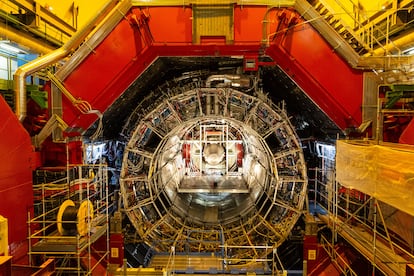For decades, scientific research centers in Europe and the discoveries they have facilitated have transformed our understanding of the world and influenced our daily lives. This year marks the anniversaries of two of the most ambitious scientific projects in Europe: 70 years of CERN or European Laboratory for Particle Physics and 50 years of European Molecular Biology Laboratory (EMBL)which established a headquarters in Barcelona in 2017.
The EMBL investigates the molecular basis of life in its context and in dynamic and changing environments. EMBL’s research and services help address major societal challenges, from disease treatment to global food insecurity. In addition to carrying out its own research, EMBL empowers European scientists to innovate by providing access to cutting-edge technologies such as high-resolution microscopes and advanced data analysis tools.
For its part, CERN studies the smallest components of matter and the fundamental laws of physics. The discovery of the Higgs boson in 2012 shed light on the mechanism that allowed the formation of matter in the early universe, about 13.8 billion years ago, making our own existence possible. Understanding the properties of this very special particle will allow humanity to make crucial progress in understanding the structure and evolution of the universe.
Although the scientific objectives of both organizations are fascinating, the impact that the creation of new knowledge has on society at large is less known. At a time when Europe faces competing priorities, we must not lose sight of the role that fundamental research plays in long-term prosperity and competitiveness.
The World Wide Web, one of humanity’s most disruptive inventions, was developed at CERN in 1989 and made available to the public for free. The knowledge generated by CERN in particle accelerators is promoting advanced treatments for the fight against cancer, which are already used clinically.
Likewise, in the 1980s, EMBL laid the foundation for electron cryomicroscopy, work that was awarded the Nobel Prize in Chemistry in 2017. This advanced microscopy technique allows molecules within cells to be visualized with atomic resolution, facilitating the development of new drugs and vaccines.
At a time when artificial intelligence (AI) is advancing at a dizzying pace, organizations like CERN and EMBL are becoming even more relevant. Europe’s position in AI development is supported by decades of work by scientists, generating and sharing large volumes of high-quality scientific data. This data is essential for training new AI tools.

Ronald Patrick (Getty Images)
The AI AlphaFoldwhose creators at Google DeepMind won the Nobel Prize in Chemistry this year, was trained using the resources of EMBL’s open databases. AlphaFold accurately predicts the shape of proteins to help researchers understand how life works and develop new medical treatments. EMBL has helped make these predictions freely available to everyone.
Intergovernmental scientific organizations such as CERN and EMBL, among many others, are not only jewels of science, technology and innovation, but also promote values fundamental to a sustainable future for humanity. Its scientific excellence attracts large communities of researchers from Europe and other parts of the world to collaborate without borders.
They foster an open, diverse and inclusive environment, and establish mutually beneficial industry partnerships. In addition, they train future generations of scientists, engineers and technicians, providing society with a much-needed source of talent in the areas of Science, Technology, Engineering and Mathematics (STEM).
EMBL databases are used by nearly 40 million people worldwide to answer essential questions in the life sciences. In 2023, EMBL collaborated with hundreds of institutes from more than 60 countries. That same year, CERN infrastructure and data were used by more than 17,000 scientists from nearly 1,000 institutions in more than 80 countries. In addition, the laboratory trained some 4,500 young people and signed 51 knowledge transfer contracts with companies, hospitals and other institutes.
Several studies show that European research institutions provide an enormous return on investment. At CERN, for example, an independent economic analysis has shown that the cost-benefit ratio of the current upgrade of the Large Hadron Collider is about 1.8. This is mainly due to the training of young scientists and indirect effects on the industry. According to an independent analysis from 2021, EMBL’s open databases directly support scientific research with an estimated value of €1.5 billion.
To unlock the full potential of Europe’s research institutions and carry out ambitious projects that go beyond the capabilities of individual countries, we need robust, long-term funding. CERN and EMBL have benefited for decades from the strong and continuous support of their Member States and partners. We must work with governments, the European Union and bodies such as the United Nations to enable more results from curiosity-driven research to reach society. Finally, sustained investment in education is needed to develop the talent of tomorrow and establish programs that allow young people to develop their careers in unique places such as CERN and EMBL.
Science has both cultural and economic value. It helps us understand the universe and ourselves, and generates creative solutions to global challenges such as disease, pollution and biodiversity loss. Most importantly, it provides hope. If Europe is to prosper in the coming decades, science needs sustained investment commensurate with the challenges it is asked to address, as well as unwavering political prioritisation, now more than ever.
Fabiola Gianotti is general director of CERN.
Edith Heard FRS is general director of EMBL.

